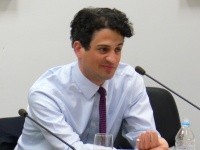Registration
You will receive an email confirming your registration.
IMGXYZ2468IMGZYXAt the 2009 Munich Security Conference, U.S. Vice President Biden spoke of a “reset” in U.S.-Russia relations. Over the past year, the concept of the reset has been central to bilateral relations. Speaking at the Carnegie Moscow Center, Samuel Charap, associate director for Russia and Eurasia at the Center for American Progress (Washington, D.C.), discussed the reset’s main outcome and prospects of the new U.S. foreign policy. The event was moderated by Sam Greene.
The reset – a new U.S. foreign policy approach
According to Charap, the reset represents a substantive change in U.S. foreign policy, not just a rhetorical shift. The reset should become a foundation for building future U.S.-Russia relations. He described the reset as an effort to move ahead in search of solutions to vital security concerns.
The new approach has been demonstrated by:
- A change in tactics and rhetoric, in favor of an increased focus on transparency in relations.
- An understanding of the necessity of reaching top-priority agreements with Russia. Disagreements about democracy and human rights issues are no longer seen as precluding cooperation on priority issues, such as nuclear nonproliferation and terrorism.
The results of the reset:
- START: The reset’s biggest success came with the April 8, 2010, signature of a new treaty between Russia and the United States on further reductions and limitations of strategic offensive weapons.
- Iran: The two sides have made progress on Iran, with Russia expressing a new openness to the possibility of introducing sanctions against Iran. As a consequence, the mood of U.S.-Russia relations changed, as well.
- Afghanistan: The two sides are cooperating on Afghanistan: today, nearly a quarter of all non-lethal cargo uses the Russian railroad to reach NATO positions in Afghanistan.
“No news is good news”
In Charap’s opinion, the reset may further be credited with preventing adverse developments from happening:
- There was no repeat of the Russian-Georgian military conflict.
- Moscow did not intervene directly in the Armenian-Turkish peace process, with Russia instead joining U.S. calls for a timely solution to the conflict.
- The Ukrainian elections did not develop into a confrontation between Russia and the West.
Problems and mistakes
In spite of the success of the reset, U.S.-Russia relations still face some significant difficulties ahead. Charap noted several potential problems:
- U.S.-Russia relations continue to be troubled by the situation in Georgia.
- Long-standing issues like the situation with democracy and human rights in Russia have yet to be resolved.
- The new financial model for Russian non-governmental organizations never worked out.
The biggest mistake, however, was done in the field of strategic communication – or PR. From the very start, there was a misunderstanding of what this “reset” really was, which led to inflated expectations. And Washington’s messages to Moscow were not always consistent.
The new START treaty’s ratification prospects
Charap concluded his speech with a look at the problems facing the ratification of a new START treaty. He suggested that the odds of ratification in the United States were 50-50. This, he argued, is primarily the result of the escalation of U.S. domestic politics, where Republicans believe that “saying ‘no’ to the president’s every initiative” will bring them victory at the next elections. Charap underscored that for many Republicans disarmament is a sin and missile defense is a virtue. U.S. ratification, he concluded, is going to be an uphill climb.
